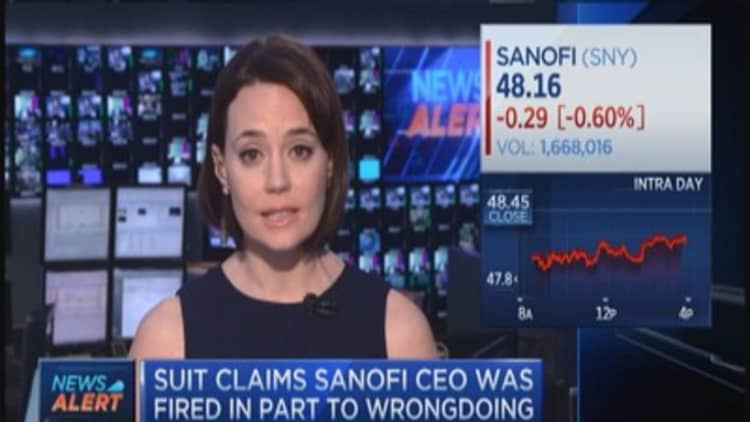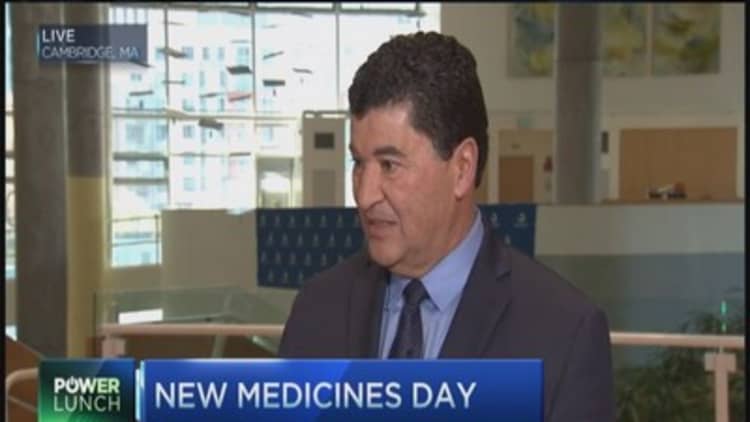
More than two years after paying $109 million to settle claims related to allegedly providing arthritis drug samples to doctors as kickbacks, pharma giant Sanofi has yet to sign a corporate integrity agreement with federal health regulators that was expected to follow that settlement.
The company said Friday, when asked about the status of that agreement, that it "expects to enter into a corporate integrity agreement with the Office of the Inspector General of the United States Department of Health and Human Services."
"Discussions with the U.S. government are ongoing to resolve the matter completely," Sanofi said.
Under such agreements, drug companies and medical providers say they will comply with various conditions after being accused of a False Claims Act violation in exchange for the OIG not seeking to bar them from participating in government-run insurance programs.
But even as that agreement remains in limbo, Sanofi is facing new allegations of kickbacks in a whistleblower lawsuit that claims the company and its then CEO paid out tens of millions of dollars in kickbacks to induce doctors, hospitals and pharmacy chains to prescribe and buy diabetes drugs.
Read MoreSuit claims Sanofi 'kickback' scheme
Sanofi also was sued in Manhattan federal court on Thursday night in a shareholder class-action suit, which mentions both the whistleblower's claims, the recent ouster of Sanofi CEO Christopher Viehbacher and the company's announcement in October that it was investigating "anonymous allegations" of improper payments to health-care professionals in the Middle East and East Africa in connection with the sale of pharmaceutical products.
Sanofi's 2012 settlement with the Justice Department related to samples of the arthritis drug Hyalgan contains an ominous warning to the company of possible further sanctions by the government even without a corporate integrity agreement being in place if authorities determine the company isn't behaving.
That settlement notes that HHS' inspector general "expressly reserves the right to institute, to direct, or to maintain any administrative action seeking exclusion against Sanofi U.S. and/or its officers, directors and employees from Medicare, Medicaid and all other federal health-care programs." Such an exclusion of Sanofi's products from being reimbursable for patients under government health insurance programs could cost the company well in excess of the $109 million check Sanofi cut to settle the case in 2012.
In the Hyalgan case, the federal government said that from 2005 through 2009, Sanofi's sales representatives were handing out large numbers of samples of the drug, which were then used to "leverage" sales. Some doctors were given a certain amount of free samples in exchange for buying certain quantities of the drug.
The government claimed that "Sanofi U.S. submitted false average sales price (ASP) reports for Hyalgan that failed to account for free units distributed contingent on Hyalgan purchases. The government alleges that the false ASP reports, which were used to set reimbursement rates [for Medicaid and Medicare] caused government programs to pay inflated amounts for Hyalgan and a competing product," the Justice Department said in a statement in 2012.
Whether HHS would take that draconian step of excluding Sanofi because of new kickback allegations is not clear. But an OIS spokesman confirmed the agency is aware of the new claims, which were first reported by CNBC.com on Wednesday.
Read MoreWeek 2 for Obamacare enrollment slows—quite a bit
Those new claims related to the diabetes drugs are contained in a suit filed Wednesday in New Jersey Superior Court by Diane Ponte, a longtime Sanofi paralegal who was fired in September. Ponte claims her termination was in retaliation for her having brought to light in 2013 alleged fraudulent contracts Sanofi had with the consulting firms Accenture and Deloitte. Neither Accenture nor Deloitte is named as a defendant in the suit. Accenture declined to comment, and a Deloitte spokesman said "we are confident our contracts and services were entirely appropriate."
But Ponte's suit claims those contracts, worth $34 million in all, acted as vehicles to provide kickbacks or other financial incentives, to medical providers and the pharmacy chains Walgreen and Rite-Aid.
Such kickbacks are illegal because they can encourage the prescription of drugs that are covered by federal Medicare and Medicaid insurance programs, and thus have taxpayers foot the bills for medication that might otherwise not have been prescribed. Ponte's suit also claims that $1 billion is missing from Sanofi and is unaccounted for.
Ponte's suit claimed that a kickback scheme had existed for years, and that Viehbacher was fired as CEO in October by the French company's board "in part, because Defendant Viehbacher was involved in the aforesaid illegal and/or fraudulent activity," which allegedly went on "over the course of many years."
The suit also claimed that Sanofi's vice president in charge of its U.S. diabetes business, Dennis Urbaniak, was involved in the scheme as well, and that he was allowed to retire in mid-2013 after she brought the situation to light. He then was hired by Accenture.

The suit's defendants include Sanofi, Viehbacher, Urbaniak and other employees of the company. Urbaniak has not returned requests for comment. Viehbacher, in a statement issued to the Bloomberg news service, said, "The allegations contained in this wrongful termination lawsuit are entirely baseless and are categorically false."
Read More
"Because this matter is in litigation, however, it would not be appropriate to provide any further comment," Viehbacher told Bloomberg for the story published Friday.
Sanofi has said: "Diane Ponte is a disgruntled former employee who is opportunistically attacking our company. Ponte filed for violations of New Jersey state employment law, specifically the New Jersey Conscientious Employee Protection Act (CEPA). The employment law allegations are without merit, and Sanofi will vigorously defend the suit. We take this matter very seriously and will protect our company and our reputation."
In response to that statement, Ponte's lawyer Rosemarie Arnold told CNBC: "Sanofi's brazen and cocky reaction to this lawsuit is predictably similar to their reaction to Ms. Ponte, when she discovered and reported their illegal activity. The evidence in this case will prove that Sanofi acted illegally with respect to their business and when they fired plaintiff for reporting their illegal activity. When this evidence is revealed in discovery, Sanofi will wish they had a drug to cure castration."
Arnold added, "And what it is conspicuously absent from their statement is a denial of the factual allegations, clearly spelled out in the complaint."
Sanofi declined to comment on Arnold's latest statement.
However, the company did say that the departure in mid-November of the executive who oversaw the sale of diabetes drugs to doctors in the eastern United States, Bob Rossilli, was not connected to any allegations of kickback at the company made by Ponte. Bloomberg had reported Rossilli's departure on Thursday in a story that noted that Sanofi had recently revealed that revenue from its top-selling insulin is projected to be flat in 2015.
Sanofi declined to comment on the class-action shareholder lawsuit filed against the company, Viehbacher and Sanofi Chief Financial Officer Jerome Contamine in Manhattan federal court on Thursday, which claims violations of federal securities laws.
That lawsuit filed by the Pomerantz law firm claims that from February 2013 through this past Wednesday, the defendants "made materially false and misleading statements regarding the company's business" by failing to disclose that "Sanofi was making improper payments to health-care professionals in connection with the sale of pharmaceutical products in violation of federal law," and that it made "materially false and misleading" public statements as a result.
The suit notes that Sanofi's stock fell by nearly 6 percent on Oct. 29, the day Viehbacher's termination was announced. Since Sept. 19, when the stock was trading at a high of $56.69 per share, it has fallen about $10, and closed unchanged at $46.75 on Friday.


